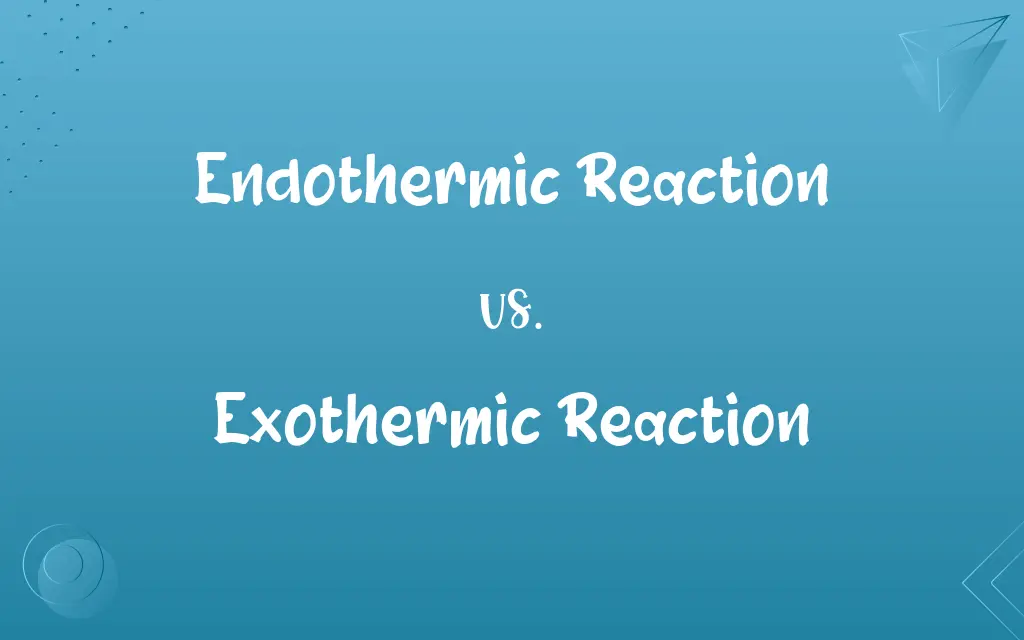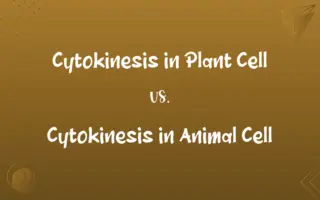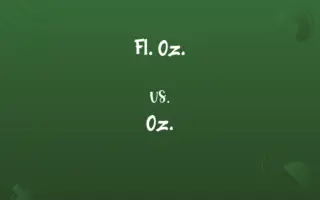Endothermic Reaction vs. Exothermic Reaction: Know the Difference

By Shumaila Saeed || Published on February 27, 2024
Endothermic reactions absorb heat from their surroundings, while exothermic reactions release heat into their surroundings.

Key Differences
Endothermic reactions require energy, typically in the form of heat, from their surroundings to proceed, causing a drop in temperature. Exothermic reactions, in contrast, release energy as heat, often increasing the temperature of their surroundings.
Shumaila Saeed
Feb 27, 2024
In an endothermic reaction, the total energy of the products is higher than that of the reactants, indicating the absorption of energy. For exothermic reactions, the energy of the products is lower than that of the reactants, showing energy release.
Shumaila Saeed
Feb 27, 2024
Endothermic reactions are common in processes like photosynthesis and the melting of ice. Exothermic reactions are typical in combustion and many oxidation processes.
Shumaila Saeed
Feb 27, 2024
An example of an endothermic process is the dissociation of calcium carbonate to form calcium oxide and carbon dioxide. In contrast, the reaction of natural gas with oxygen to produce carbon dioxide and water is exothermic.
Shumaila Saeed
Feb 27, 2024
The energy change in endothermic reactions can be measured as a positive value, whereas in exothermic reactions, it is a negative value, reflecting the direction of heat flow.
Shumaila Saeed
Feb 27, 2024
ADVERTISEMENT
Comparison Chart
Energy Change
Positive (products have more energy)
Negative (products have less energy)
Shumaila Saeed
Feb 27, 2024
Temperature Effect
Surrounding temperature decreases
Surrounding temperature increases
Shumaila Saeed
Feb 27, 2024
ADVERTISEMENT
Endothermic Reaction and Exothermic Reaction Definitions
Endothermic Reaction
Endothermic reactions often require continuous energy input to proceed.
Photosynthesis is an endothermic reaction, needing sunlight to convert CO2 and water into glucose.
Shumaila Saeed
Jan 11, 2024
Exothermic Reaction
In exothermic reactions, the products have lower energy than the reactants.
The rusting of iron is an exothermic process, releasing energy.
Shumaila Saeed
Jan 11, 2024
Endothermic Reaction
An endothermic reaction absorbs energy from its surroundings, usually as heat.
Evaporating water is an endothermic reaction that absorbs heat, causing cooling.
Shumaila Saeed
Jan 11, 2024
Exothermic Reaction
Exothermic reactions often lead to an increase in temperature of the surroundings.
The reaction of quicklime with water is exothermic, producing heat.
Shumaila Saeed
Jan 11, 2024
Endothermic Reaction
In endothermic reactions, the products have higher energy than the reactants.
The process of cooking an egg is endothermic, as it absorbs heat.
Shumaila Saeed
Jan 11, 2024
ADVERTISEMENT
Exothermic Reaction
These reactions can occur spontaneously, releasing energy without external aid.
The formation of ice from water is an exothermic reaction.
Shumaila Saeed
Jan 11, 2024
Endothermic Reaction
These reactions are characterized by a temperature drop in their surroundings.
The dissolution of ammonium nitrate in water is endothermic, causing the solution to feel cold.
Shumaila Saeed
Jan 11, 2024
Exothermic Reaction
Exothermic processes are common in everyday chemical reactions and industrial applications.
The explosive reaction of dynamite is a highly exothermic process.
Shumaila Saeed
Jan 11, 2024
Endothermic Reaction
Endothermic processes are integral to various industrial and biological systems.
The production of ammonia by the Haber process is an endothermic reaction.
Shumaila Saeed
Jan 11, 2024
Exothermic Reaction
An exothermic reaction releases energy, typically as heat, to its surroundings.
The combustion of wood in a fireplace is an exothermic reaction, releasing heat.
Shumaila Saeed
Jan 11, 2024
Repeatedly Asked Queries
What is an endothermic reaction?
An endothermic reaction absorbs heat from the surroundings, leading to a temperature decrease.
Shumaila Saeed
Feb 27, 2024
Can endothermic reactions occur naturally?
Yes, endothermic reactions like photosynthesis occur naturally.
Shumaila Saeed
Feb 27, 2024
Do endothermic reactions always involve a temperature decrease?
Yes, endothermic reactions typically result in a decrease in temperature in the surroundings.
Shumaila Saeed
Feb 27, 2024
Can endothermic reactions occur at room temperature?
Yes, they can occur at room temperature if the reaction requires energy input to proceed.
Shumaila Saeed
Feb 27, 2024
Are endothermic reactions common in nature?
Endothermic reactions are less common in nature compared to exothermic reactions.
Shumaila Saeed
Feb 27, 2024
How can you tell if a reaction is endothermic by observing a chemical equation?
If a reaction has a positive ΔH (enthalpy change) value, it is endothermic.
Shumaila Saeed
Feb 27, 2024
Is the freezing of water an exothermic or endothermic process?
The freezing of water is an exothermic process because it releases heat as it turns into ice.
Shumaila Saeed
Feb 27, 2024
What is an exothermic reaction?
An exothermic reaction releases heat into the surroundings, often increasing the temperature.
Shumaila Saeed
Feb 27, 2024
Do exothermic reactions always involve a temperature increase?
Yes, exothermic reactions typically result in a temperature increase in the surroundings.
Shumaila Saeed
Feb 27, 2024
Can you give an example of an everyday endothermic process?
Melting ice is an everyday example of an endothermic process as it requires heat absorption.
Shumaila Saeed
Feb 27, 2024
Are endothermic reactions spontaneous?
Endothermic reactions are usually non-spontaneous and require an external source of energy to occur.
Shumaila Saeed
Feb 27, 2024
Can you provide an everyday example of an exothermic process?
Cooking food on a stove is an everyday example of an exothermic process as it releases heat.
Shumaila Saeed
Feb 27, 2024
Are exothermic reactions common in nature?
Exothermic reactions are quite common in nature and are often associated with energy release in various processes.
Shumaila Saeed
Feb 27, 2024
How can you tell if a reaction is exothermic by examining a chemical equation?
If a reaction has a negative ΔH (enthalpy change) value, it is exothermic.
Shumaila Saeed
Feb 27, 2024
Can exothermic reactions occur at low temperatures?
Yes, they can occur at low temperatures if the reaction releases enough heat to raise the temperature.
Shumaila Saeed
Feb 27, 2024
Why does an exothermic reaction feel warm or produce heat?
It feels warm because it releases heat energy into the surroundings.
Shumaila Saeed
Feb 27, 2024
Are exothermic reactions spontaneous?
Exothermic reactions are often spontaneous and can occur without external energy input.
Shumaila Saeed
Feb 27, 2024
Share this page
Link for your blog / website
HTML
Link to share via messenger
About Author
Written by
Shumaila SaeedShumaila Saeed, an expert content creator with 6 years of experience, specializes in distilling complex topics into easily digestible comparisons, shining a light on the nuances that both inform and educate readers with clarity and accuracy.































































